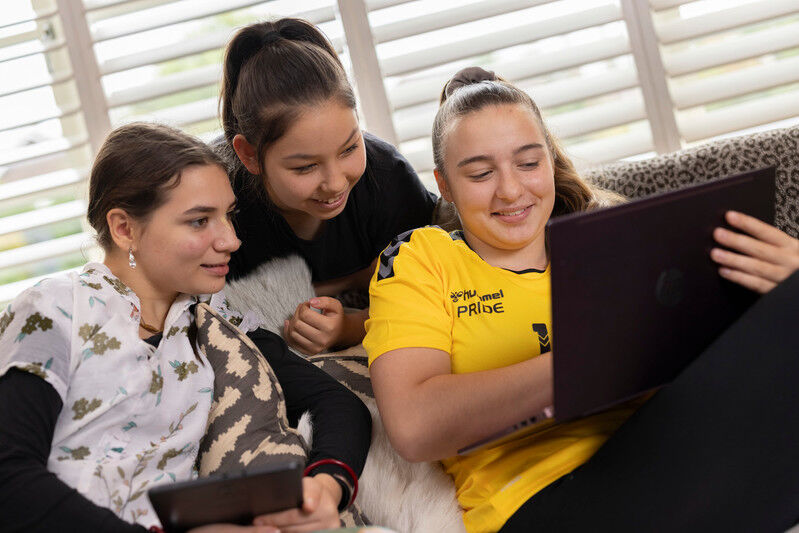
April 6, 2022
How online homeschooling helps with socialisation
There are so many great reasons why families turn to home education, from the flexibility through to the power of child-led learning. However, one of the biggest concerns parents often face is whether their child will be missing out on being able to make friends and develop their social skills.
In a ‘bricks and mortar’ school, children will have break times and a lunch every day, presenting endless opportunities to make friends with classmates and enjoy games or activities together. They will also have regular communication with other children their age in lessons. In a home learning environment, this is usually not the case – but it can be.
Although home educating families can’t re-create exactly the social opportunities available in a traditional school environment, they can take action to help their child make friends and participate in activities, with tools like online homeschooling support.
How home educating families deal with isolation
Home education had been growing steadily in popularity every year over the last decade, but the recent pandemic has made it feel significantly more mainstream to most parents. Previously, most people would have had reservations about their children studying at home, but now that they have seen it first hand, they realise it has some clear advantages.
For those families who have decided to replace mainstream school with full time home education, one of the biggest challenges is how to deal with the isolation their child could face. The good news is that home educating families are not alone and there is an ever-growing number of online and offline communities that parents can lean on for support. Through these communities, it is possible to find other local home educating families and arrange activities and events.
One of the most obvious things a parent can do is encourage their child to take part in out-of-school activities such as sport, music lessons or clubs. This gives their child a chance to form friendships with other local children.
In some cases, students will connect and make friends online. With the rise in popularity in online gaming, it is not uncommon for children to find like-minded friends of a similar age online. We would, however, recommend that parents keep an eye on who their children are talking to online and which online groups they join.
What home educating students experience at a virtual school
Due to the widespread availability of online learning resources and the rise in popularity of online virtual schools, students who are home educated now have more options for how they complete their studies. A virtual school will re-create the learning environment of a traditional school in an online (and safe) setting.
Physical classrooms are swapped out for virtual classrooms that resemble being part of a group video call, but where the teacher holds the spotlight and has all the control. Lessons are often timetabled, giving students more structure to their days. Good virtual schools will also provide a range of other perks, such as online lesson libraries, as well as features that allow students to take part in social activities.
The similarities in the social aspects between a traditional brick-and-mortar school and an online virtual school can help to bridge the gap for students, giving them plenty of opportunity to make new friends.
Socialising in lessons and study groups
Online lessons allow students to not only engage with their teacher, but also with other students. The ability to speak with teachers and ask direct questions in virtual lessons gives students access to both academic and personal support. Many of us had teachers we respected and looked to for guidance in school, and home educating children can now have a similar experience in a virtual learning environment.
During lessons, students can also break out into groups to problem solve or complete activities. This helps children to build relationships that can be carried over to activities outside of lessons, such as chatting with each other through an integrated, moderated social platform.
Online clubs and extra-curricular activities
Established virtual schools will have a rich community. As a result, there will be plenty of online clubs and extra-curricular activities to give students the chance to take part in activities with other students who have similar interests.
At King’s InterHigh, we also host regular in-person events through the year, allowing students to get to know each other face to face. In addition, there are many families who coordinate meet ups in their areas in order to socialise in person. It has been amazing to see how the friendships which started online flow so naturally when students are meeting up in person, at events such as the annual activity weekend, camps and practical science days. Our parent communities connect in-person too – the benefits of our large global community means that families all over the world can connect in-person in their local environments.




















